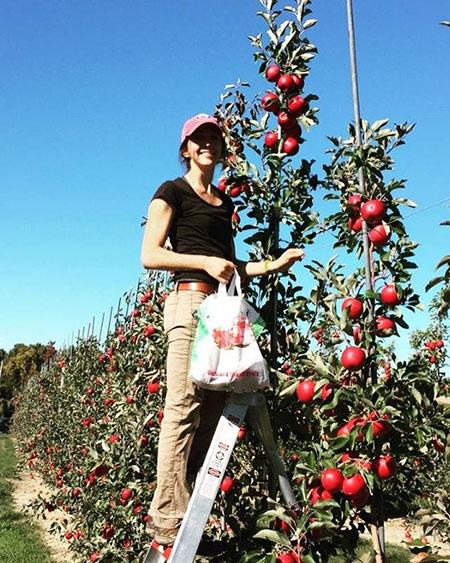
Credit: Anna Wallis
Like humans, certain plants are treated with antibiotics to ward off pathogens and protect the host. Saving millions, antibiotics are one of the 20th century’s greatest scientific discoveries, but repeated use and misuse of these life-saving microbial products can disrupt the human microbiome and can have severe effects on an individual’s health. Overuse has led to several microbes developing resistance to the antibiotic, rendering it useless, and created “superbugs” that overpower medication. But do we find that same phenomenon in plants and our food industry?
This was the question Dr. Anna Wallis and colleagues investigated in their recent research “Endophytic bacterial communities in apple leaves are minimally impacted by streptomycin use for fire blight management,” published in Phytobiomes Journal in April 2021.
Pathogens like Erwinia amylovora, the causal agent of fire blight in apples, can have severe impacts on fruit production. Current management practices include using the antibiotic streptomycin to protect apples from this disease but the long-term impacts on the microbiome are poorly understood. Antibiotics are often broad-spectrum, meaning they destroy all susceptible bacteria, both good and bad. In many cases, antibiotics give relief from an immediate problem but can result in long-term negative effects as beneficial microbes are demolished from the environment.
To assess if this was true in apple orchards, Wallis and her advisor Dr. Kerik D. Cox analyzed the microbiome of apple leaves over two years in two orchards in Geneva, New York. Some were treated with various amounts of streptomycin and others were under organic management strategies without any antibiotics. Cox and a former student, Dr. Kiersten Tancos, had previously looked at the surface (epiphytic) microbiome of apple trees being treated with streptomycin and saw large effects with this application. When Wallis and Cox decided to look at the endophytic microbiomes (microbes living within the plant), they were expecting to see a similar trend.
Surprisingly, Wallis and Cox found little evidence that streptomycin altered the leaf bacterial microbiome and instead found that geographical location, even though the orchards were in close proximity, played a bigger role in bacterial composition than management strategy. While it is well-known that geography plays a role in microbial community assemblage, it is surprising this factor is a stronger influencer on the microbial composition than an antibiotic.
“Our work adds to a growing body of literature that demonstrates the sustainability of current methods [such as antibiotics] of disease control used by apple growers,” said Wallis. While previous research investigated this question by looking at just the soil or microbes living on the plant surface, this is the first study to look at the impact of streptomycin on the endophytic leaf microbiomes, which are likely attributing more to host health than the surface microbes.
The authors hypothesize the endophytic microbiomes are more resilient to the streptomycin application because of the possibility of naturally obtaining resistance to the antibiotic application. Soil and plant microbiomes are filled with several microbes that have the innate ability to produce antibiotics. So, while Erwinia amylovora remains susceptible to streptomycin, it is likely the soil and endophytic microbiome have naturally acquired resistance to streptomycin prior to commercial applications.
Interestingly, several other papers have shown that soil amendments and other crop manipulations dramatically impact the microbial communities and may make them beneficial to the crop. Because streptomycin is naturally occurring in soils and agricultural environments, it is not known if the endophytic microbiome has gained antibiotic resistance to streptomycin in the last few years or if the innate apple microbiome has long had resistance to this antibiotic. Current evidence suggests streptomycin is a sustainable management strategy for fire blight of apple.
###
Dr. Anna Wallis, the lead author, hopes to continue her work in sustainable apple and tree crop agriculture. She recently defended her Ph.D. and has started a position with Michigan State University Extension as the Tree Fruit Production Specialist in the Grand Rapids Region. You can read more about her work in the article published in Phytobiomes Journal or you can follow her on Twitter @jesuisunanana. Dr. Kerik Cox, the corresponding author of this paper, is an associate professor at the School of Integrative Plant Science Plant Pathology and Plant-Microbe Biology Section at Cornell AgriTech. He is an expert in fungal ecology and understanding fungicide resistance in orchards.
Author Bio: Tess Deyett, Ph.D. is a current postdoc under the guidance of Dr. Philippe Rolshausen at the University of California Riverside. She serves as an assistant feature editor for the Phytobiomes Journal. A passionate and driven science communicator, Tess also hosts her own website microbigals.com and podcast The Microbe Moment. She aspires to share how microbes are a constant force of good to every person and that everyone has many unique microbe moments!
Media Contact
Tess Deyett
[email protected]
Related Journal Article
http://dx.




